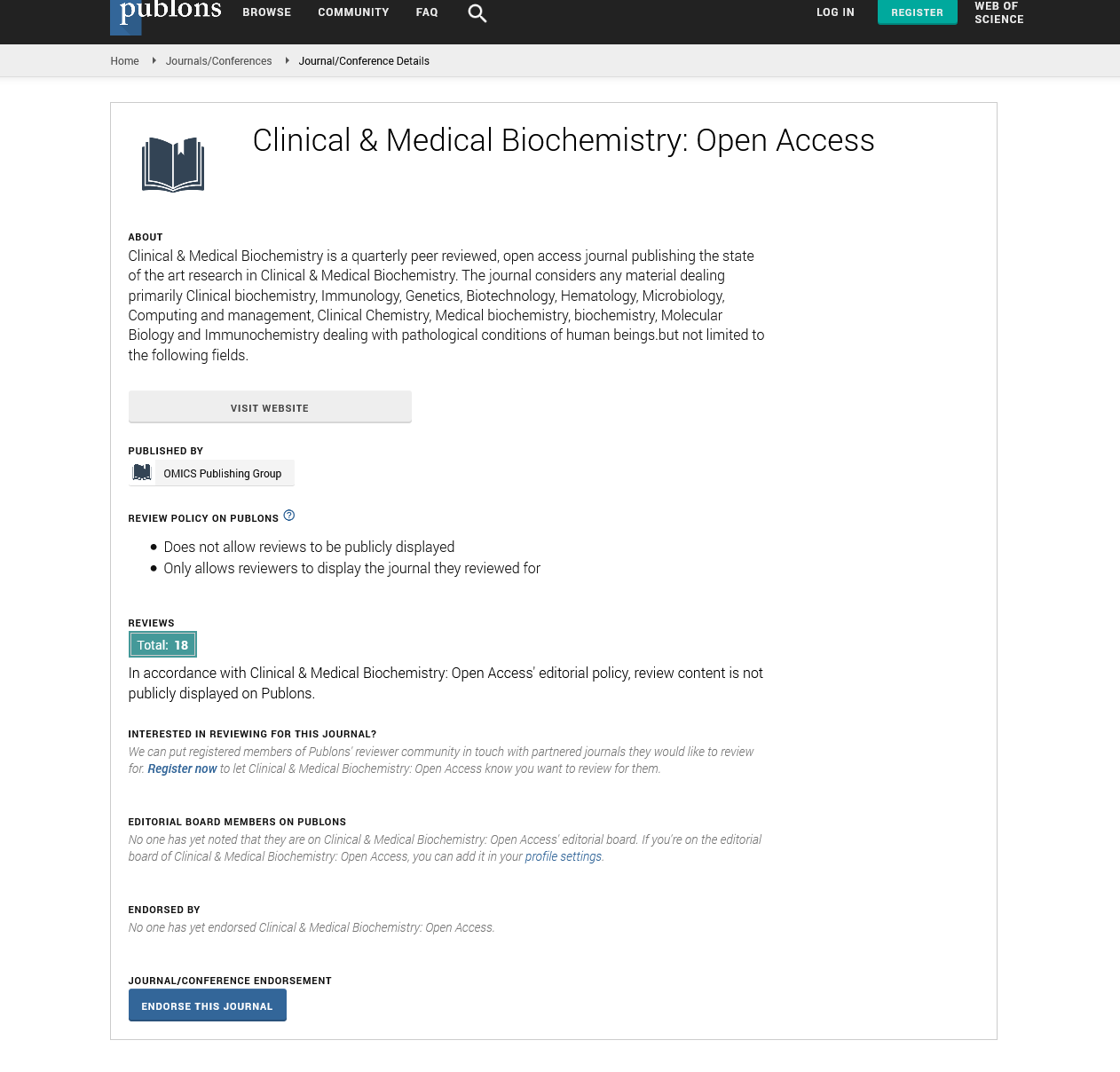Indexed In
- RefSeek
- Directory of Research Journal Indexing (DRJI)
- Hamdard University
- EBSCO A-Z
- OCLC- WorldCat
- Scholarsteer
- Publons
- Euro Pub
- Google Scholar
Useful Links
Share This Page
Journal Flyer

Open Access Journals
- Agri and Aquaculture
- Biochemistry
- Bioinformatics & Systems Biology
- Business & Management
- Chemistry
- Clinical Sciences
- Engineering
- Food & Nutrition
- General Science
- Genetics & Molecular Biology
- Immunology & Microbiology
- Medical Sciences
- Neuroscience & Psychology
- Nursing & Health Care
- Pharmaceutical Sciences
Commentary - (2024) Volume 10, Issue 3
Diabetes Mellitus Complications: Strategies for Prevention and Management
Mia Emily*Received: 28-Aug-2024, Manuscript No. CMBO-24-26873; Editor assigned: 30-Aug-2024, Pre QC No. CMBO-24-26873 (PQ); Reviewed: 13-Sep-2024, QC No. CMBO-24-26873; Revised: 20-Sep-2024, Manuscript No. CMBO-24-26873 (R); Published: 27-Sep-2024, DOI: 10.35841/2471-2663.24.10.228
Description
Diabetes mellitus, a metabolic disorder characterized by chronic hyperglycemia, poses significant risks of complications that can impact various organ systems. Effective prevention and management strategies are essential to soften these risks and improve patient outcomes. Diabetes complications can broadly be categorized into microvascular and macrovascular effects. Microvascular complications primarily affect small blood vessels and include diabetic retinopathy, nephropathy and neuropathy. Macrovascular complications involve larger blood vessels and include conditions such as cardiovascular disease and peripheral artery disease. Diabetic retinopathy, a leading cause of blindness among adults, results from damage to the retinal blood vessels due to prolonged high blood glucose levels. Early stages may be asymptomatic, but cumulative damage might result in vision impairment or loss. Regular eye examinations are essential for early detection. Management includes maintaining optimal blood glucose control, managing blood pressure and developing laser therapy or anti-Vascular Endothelial Growth Factor (anti-VEGF) injections for advanced cases.
Diabetic nephropathy, characterized by kidney damage, can progress to end-stage renal disease if not resolved. Proteinuria and deteriorating renal function are common signs of the illness. Preventative strategies include controlling blood glucose levels, managing blood pressure with Angiotensin-Converting Enzyme (ACE) inhibitors or Angiotensin Receptor Blockers (ARBs) and regular screening for kidney function. In advanced stages, dialysis or kidney transplantation may be necessary. Diabetic neuropathy affects the peripheral nerves and can lead to symptoms such as pain, tingling and loss of sensation. This complication increases the risk of foot injuries and ulcers, which can become severe if not managed appropriately. Regular foot examinations, proper foot care and the use of protective footwear are essential preventative measures. Managing blood glucose levels and using medications to alleviate pain, such as certain antidepressants or anticonvulsants, can help manage symptoms.
Macrovascular complications, including cardiovascular disease, are a significant concern for individuals with diabetes. They result from the accelerated development of atherosclerosis, where fatty deposits accumulate in the arterial walls, leading to increased risk of heart attacks and strokes. Prevention strategies include maintaining a healthy diet, interacting in regular physical activity and controlling risk factors such as hypertension, dyslipidemia and smoking. Medications like statins and antihypertensives may be prescribed to manage cholesterol levels and blood pressure. Peripheral artery disease, another macrovascular complication, involves the narrowing of arteries in the legs, leading to pain, cramping and reduced mobility. Preventative strategies mirror those for cardiovascular disease and include the changes in life such as quit smoking and regular exercise. In more severe cases, medications or surgical interventions may be required. Effective diabetes management depends on a complex approach that integrates lifestyle modifications, pharmacological treatments and regular monitoring. Main components of diabetes management include blood glucose control, dietary adjustments, physical activity and adherence to prescribed medications. Blood glucose levels should be observed regularly to ensure they remain within target ranges and insulin or oral hypoglycemic agents may be necessary to achieve this control.
Dietary management focuses on balanced nutrition, emphasizing the importance of a diet rich in whole grains, lean proteins, fruits and vegetables while minimizing refined sugars and unhealthy fats. Portion control and meal planning are integral to managing blood glucose levels. Consulting with a registered dietitian can provide personalized dietary guidance and support. Physical activity plays a significant role in diabetes management by improving insulin sensitivity and helping in weight control. Regular exercise, such as brisk walking, cycling, or swimming, can help maintain cardiovascular health and manage blood glucose levels. Patients should aim for at least 150 min of moderateintensity exercise per week, incorporating both aerobic and resistance training.
Pharmacological treatments for diabetes include various classes of medications, such as metformin, sulfonylureas and GLP-1 receptor agonists. These medications help to regulate blood glucose levels and manage symptoms. Insulin therapy may also be required for individuals with type 1 diabetes or those with type 2 diabetes whose blood glucose levels cannot be controlled with oral medications alone. In addition to medical treatments, patient education and self-management play essential roles in preventing and managing complications. Allowing individuals with diabetes to make informed decisions about their health, including monitoring blood glucose, following to medication treatments and adopting a healthy lifestyle, is vital for effective disease management.
Conclusion
In conclusion, effectively preventing and managing diabetes complications necessitates a complete approach that includes lifestyle adjustments, medical treatments and consistent monitoring. Implementation healthy eating, regular physical activity and compliance to prescribed medications, combined with regular health check-ups, allow individuals to minimize their risk of complications. This complete approach greatly improves diabetes management and overall standard of life.
Citation: Emily M (2024). Diabetes Mellitus Complications: Strategies for Prevention and Management. Clin Med Bio Chem. 10:228.
Copyright: © 2024 Emily M. This is an open-access article distributed under the terms of the Creative Commons Attribution License, which permits unrestricted use, distribution, and reproduction in any medium, provided the original author and source are credited.

